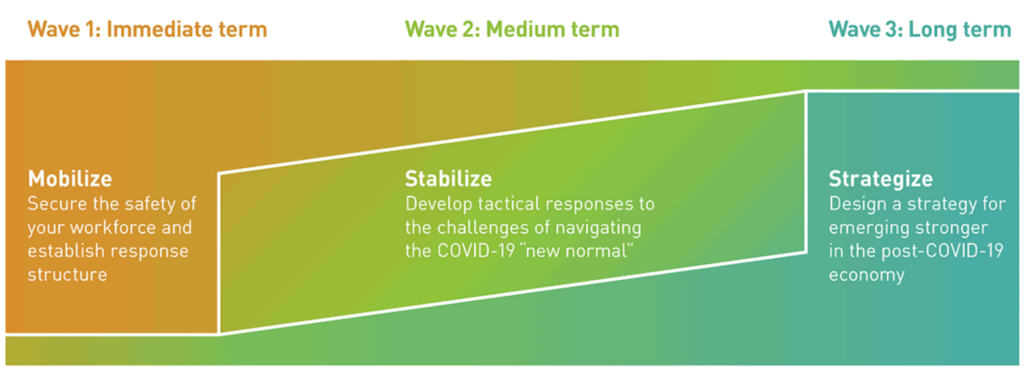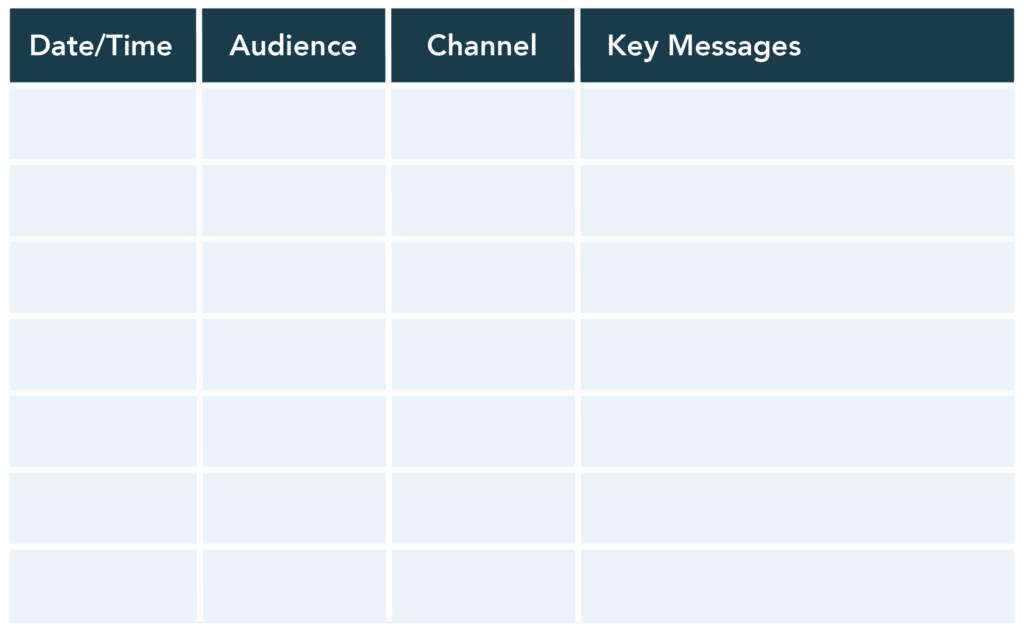How to Build a Campus Recruitment Communications Plan During a Recession
The COVID-19 pandemic and ensuing economic downturn has triggered formal and informal crisis management plans at many organizations. Whether your company is facing layoffs, is enforcing a hiring freeze, or is hiring more rapidly than ever due to emergency need, it’s important to let job seekers know where your company stands.
For campus recruiters, a recession will likely force a drastic shift in how you’re communicating with students. Internships may go virtual, interviews might be video-only, and hiring might slow for the time being. First and foremost, being upfront and keeping students informed is key to protecting your company’s reputation and ensuring future staffing success. Here’s how to build your campus recruitment communication plan during a recession.
What Is a Campus Recruitment Communications Plan?
A recruiting communications plan defines who, what, when, where, why and how to communicate about what is going on at your company. Campus recruitment communications focus on college students and other stakeholders in the campus recruiting process (i.e., hiring managers, college career services staff, college job boards, diversity and inclusion professional associations, and more).
Not to split hairs, but there is a difference between a marketing plan and a communications plan. A recruitment marketing plan is promotional: it’s about sharing positive messages to successfully attract, engage and hire candidates. A recruitment communications plan is informative: whether the news is good or bad, it arms defined audiences with the information they need to be successful in the hiring process (or save themselves time if you’re not currently hiring). Right now, you need both.
Why Your Company Needs a Campus Recruiting Communications Strategy
The importance of campus recruitment communications is evident when the job market is good – they help your organization compete for and win talent. During a market downturn it may seem counterintuitive to spend time and resources on communicating with prospective talent (especially if your organization is not hiring). But not communicating at all can cause big issues now and over the long-term. How?
- If your organization does not manage the message, someone else will. As noted on Smartrecruiters.com, “There are more avenues for candidates to air their views online than ever before. Whether it is social media, or employee review sites, people aren’t afraid to share any negative experiences with other prospective candidates, potentially putting them off applying to your jobs, attending interviews, or accepting your job offers.”
- Your organization may be subject to federal or state disclosure requirements (i.e., Sarbanes-Oxley, WARN, ERISA, and more). A failure to communicate certain information in a timely manner can result in legal ramifications.
- Don’t lose the investment you’ve already made in campus recruiting. You’ll thank yourself for keeping a full talent pipeline when hiring picks up down the road.
- Even during a downturn, your company will likely have some hiring needs. Failing to maintain engagement through communication leaves the door open for your competition to scoop up highly sought talent and your organization scrambling to fill key roles.
- How you treat prospective talent today will impact how they respond to your company when the market rebounds. Ignore them now and increase the odds that they will ignore you when you may need them most.
Who Is Responsible for Campus Recruitment Communications?
If your organization has a crisis management committee created to oversee the company’s recession response and continuity plans, your campus recruitment communications must follow their lead.
In a “normal” business and economic environment, recruitment communications are typically driven by Human Resources/Talent Acquisition staff in collaboration with the marketing team and possibly other functions. During a crisis, this may change.
Usually, these teams have representatives from key parts of the business – sales, finance, technology, human resources, community giving, investor relations, legal, operations, marketing and more.
Not All Companies Are Affected Equally by the Recession
Some industries are experiencing explosive growth. Some have come to a virtual standstill overnight. Others are somewhere in the middle. A good communications plan lets your key audiences – including campus recruits — know where your company stands in this spectrum and, more importantly, where it expects to go and what it means to them. So, keep communicating!
They come together to help the organization mobilize, stabilize and strategize. While you may have to step back and let others take the lead, make sure that whoever is representing HR understands and can advocate for your campus recruitment communications.
The three waves of a COVID-19 crisis response
Organizations that successfully accelerate the speed with which they progress through the waves tend to emerge stronger

Source: Strategy-business.com
How to Build a Campus Recruitment Communications Plan During a Recession
All communication plans – including campus recruitment communications – typically have these components:
- Summary of current landscape: Provide an overview of how the business and economic landscape affects campus recruiting. Find some great stats and information from the National Association of Colleges and Employers (NACE), CareerArc, the Ivy Research Council and other hiring resources.
- Goals: Why are you developing the plan? What do you hope to achieve?
- Audiences: Who do you need to communicate with? Be detailed. Internal communication is just as important as external. When thinking about audiences, be sure to include your senior leadership team, the team leading your company’s crisis planning, HR/Talent Acquisition staff, hiring managers, and interviewers. Think about university partners, like college career centers, diversity and inclusion professional organization contacts, recruiters, job boards, and more. Last, but definitely not least, there are probably a number of distinct audiences within the campus job seekers pool, like members of your talent community, former and current interns, and those who were in the talent pipeline when everything changed.
Students want employers to understand how much weight is on their shoulders at this time and how much they need employers to coach and help them in this uncharted environment.”
Source: NACE
- Channels: Identify all channels you use to reach different audiences – webinars, virtual events, video, social media, email, websites, texting, etc. The channels you use sends a message in and of itself. A broadcast email or text sends a distinctly different message than one delivered via a personal phone call or personalized email. So, be thoughtful when deciding which channels to use for which audiences.
- Key messages: What are the main ideas you need to get across with each audience? Remember, they are mostly interested in learning “What’s in it for me?”
- Tactics: By date (and even hour if necessary), outline what will be communicated to each audience and via what channel.
Sample Communications Technical Plan Template

- Budget/Resources: If applicable, include any fees and resources that may be involved in your plan (like design fees, freelance writing, changes to online application technology, etc.)
- Success Measures: How will you know your communications are successful? Can recruitment operations practices and data analytics help you gain insight into what is working, what is not and where there may be other opportunities?
Make sure campus recruitment communications address
“What’s in it for me?”
Imagine being in college right now. Last fall, you prepared your resume, attended career fairs, completed job interviews, and received an internship or job offer. In a matter of weeks, everything has changed, leaving college recruits wondering: “What now? What does all of this mean to me?”Address the questions this audience may have in your communications plan:
- Will I still have an internship or job upon graduation?
- How will my job/internship/onboarding work in the context of social distancing guidelines?
- Will the interview/hiring process continue?
- How will it work and how can I prepare?
- How can I learn more about a work environment if I cannot even go on site?
- Will jobs/internships be there when I graduate?
- Should I still apply?
- Are employers even hiring?
Tips to Promote Successful Campus Recruitment Communications
- While a plan can guide your efforts, it is important to stay flexible and prepare to respond to the changing health, business and economic environment in real-time.
- If you already have a campus recruitment communications plan, review it now to ensure it is still accurate. You don’t want your career site to mention extensive hiring if you’re about to announce a freeze, or your social media posts to promote a position that’s no longer open.
- Agree on who needs to review communications content up front to avoid potential rework later.
- Timing really is everything. It’s better for company news to come from you rather than through the grapevine. Get in front of company announcements so you won’t be faced with surprises later.
- Leverage existing content to maintain a constant flow of information. Tap into your company’s internal communications plan for a variety of content that can easily be adapted for recruiting (i.e., employee recognition, safety, transitioning to working from home, corporate giving, and more).
- In some cases, less is more and it is better than silence. If your company does not have all the answers (or any of them), a general greeting or check-in can let recruits know you are keeping them in mind.
How Top Companies Are Communicating During the Recession
We are seeing a variety of recruiting communication approaches, depending on how companies and industries have been affected by COVID-19 and the recession. Some are experiencing a hiring surge. Some are freezing hiring, furloughing employees, or downsizing. All companies are experiencing some kind of effect, and we’re seeing some unique communications and marketing emerge as a result.
Domino’s and Frito-Lay incorporated recruiting and hiring messages into new television commercials, promoting their value proposition, employment brand and standing as good corporate citizens.
Are Candidates Being Candid About Your Hiring Status?
With the advent of COVID-19 and the economic downturn, Candor is offering a crowdsourcing tool where individuals (and companies) can provide the status of job offers, internship offers, and employment situations. Shortly after its launch, it went viral. So, you may want to check it out and see what information about your company may already be out there.
Others are balancing a recruiting surge with public relations campaigns to put out fires that can affect their employment brand and reputation. We are seeing companies include a message from the CEO outlining how the company is responding to the crisis.
Still others in industries hit hard by the recession (like hospitality and tourism) are launching regional advertisements to build goodwill and reinforce their brands as good corporate citizens, while setting the stage to succeed when the economy rebounds.
One thing is for sure: whether companies are adopting first-of-a-kind recruitment communications with national advertising or simply trying to keep their audiences updated and engaged, there is a lot of communicating going on.
“We have seen leading companies adopt a policy of shorter, more frequent communications based on what they do know and filling in details later. In the absence of a narrative from you, your teams and stakeholders may start to fill the void with misinformation and assumptions. Setting a regular cadence with a clear voice is critical. Incomplete or conflicting communications can slow the organization’s response rather than providing better guidance.”
Source: Deloitte
Interested in more examples? See how KPMG is keeping recruitment communications going to finalize 2020 campus hiring and prepare for 2021. MITRE is using communications to help interns transition to virtual work arrangements.
Next Steps
Especially during these uncertain times, it is challenging to meet all the campus recruitment demands you may be facing. Well, you don’t have to face them alone. We’re here to help with virtual recruiting resources, webinars to help you navigate COVID-19, and video interviewing tools to help you social distance while you hire.

